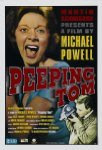Vertigo
This is perhaps Hitchcock's most serious film, eschewing the usual tongue-in-cheek humor for a character study of a seriously flawed hero in James Stewart. Uniting with Hitch for the last time as a police detective, he has a sudden vertigo attack for the first time during a chase, which leads to the accidental death of a colleague, thus starting his emotional torments. He is hired after recuperating as a private investigator to follow a man's mysterious wife, played by Kim Novak, perhaps out of her league here, and she leads him into a thickly plotted crime story that becomes his next torment.
Without spoilers, I can't describe the action, just to say that there are a couple of major plot surprises that take a routine plot into the extraordinary, largely on the performance of Stewart. Some of the film is a little cheesy, such as a psychedelic dream sequence that looks like a Warhol acid trip, or worse, a Peter Fonda 60's trip movie. The film is also a little slow and lengthy, but it remains Hitchcock's most complex character study, and film with the most depth of his Hollywood period, which, to me, wasn't as critically successful as his earlier British films in black and white (The 39 Steps, The Lady Vanishes, Strangers on a Train).
The film is somehow ranked #2 on the critics consensus poll after Citizen Kane - how it's above The Godfathers, 2001, All About Eve, Lawrence of Arabia and others is a mystery. This is #41 at IMDB, ranked after North by Northwest. Personally, I prefer Hitch's b&w British films The 39 Steps and The Lady Vanishes to any of his Hollywood productions, though Vertigo is certainly just as good, certainly is more sophisticated. Oscar® nominations for art direction and sound. Hitchcock himself never won an Oscar® which some think is a travesty, but I can see why, as no one film excelled in any particular year, he's more respected for his entire body of work.



































